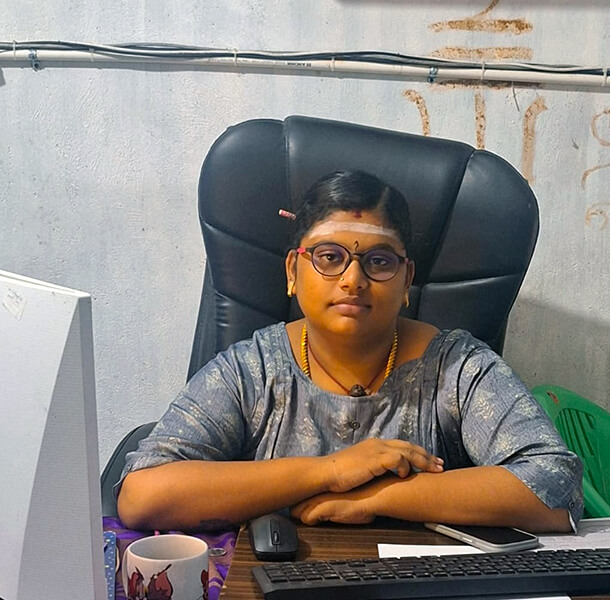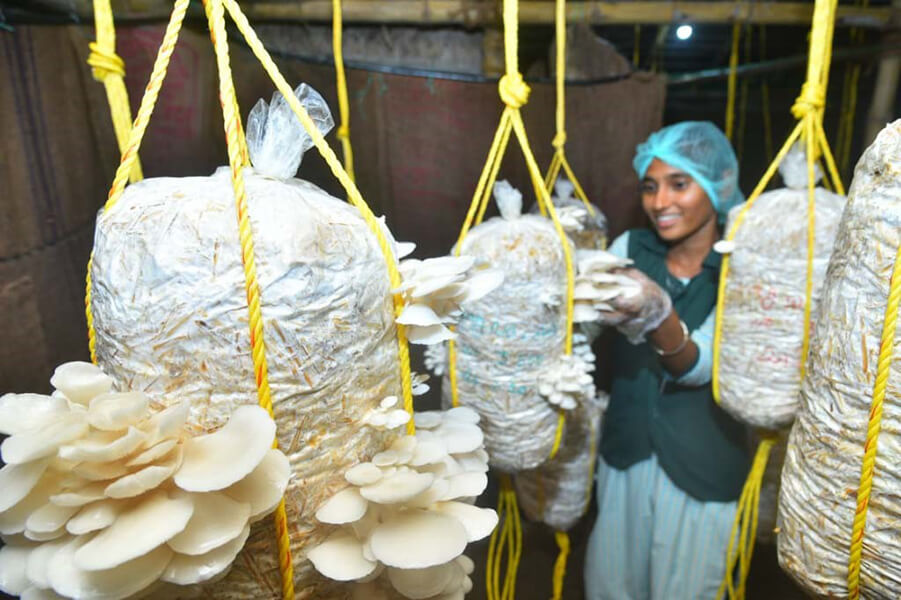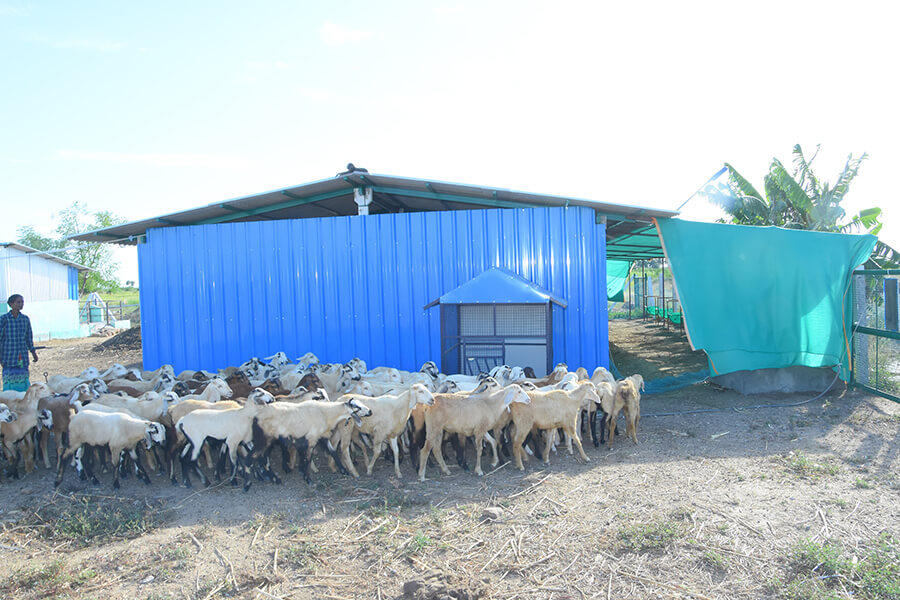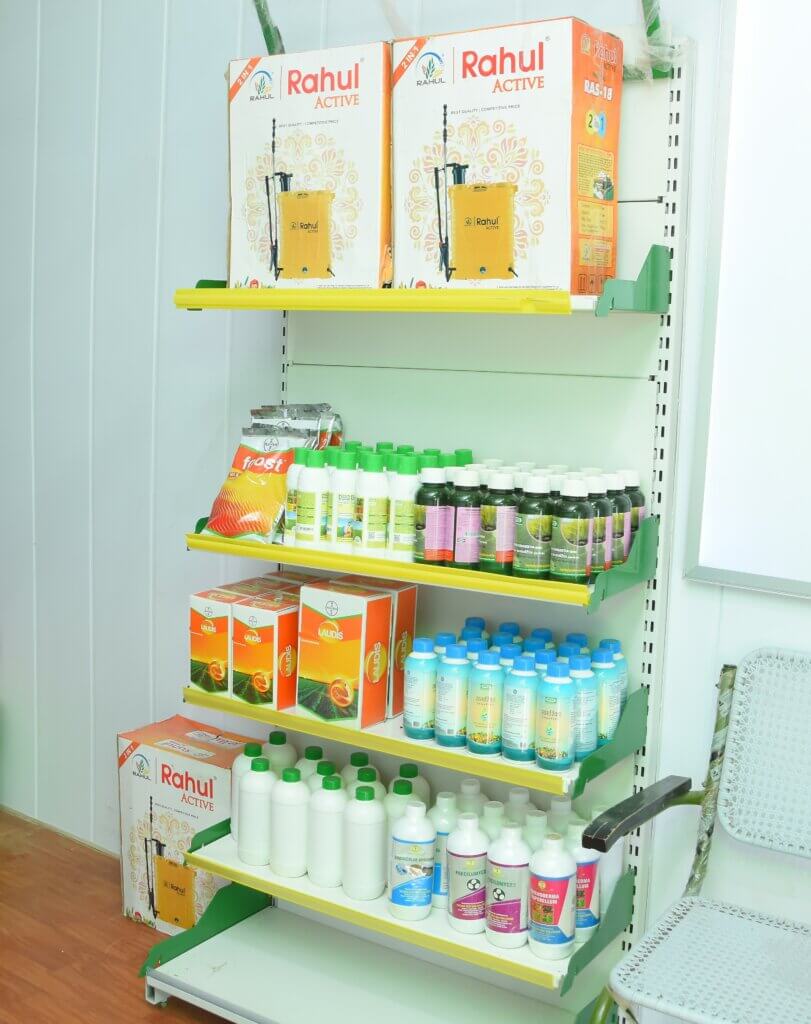Narayan Lal Gurjar is a young innovator from rural Rajasthan whose work has global impact.
Bavithra Jagatheshkumar, the CEO of a farmer producer company in Tamil Nadu’s Thoothukudi district, is helping farmers turn profitable in the face of massive challenges.
 Vijayalakshmi Sridhar
Vijayalakshmi Sridhar 
In the arid region of Thoothukudi, a coastal district at the chin of Tamil Nadu 600 km to the south of Chennai, it’s not just the buildings but also tempers that get corroded quickly by the salty air.
At around 11 am on a late December morning, when the sun beats down without baking the skin, an agitated mob of a dozen farmers has gathered at the basketball court-sized office of Vilathikulam Pudur Pulses Producer Company (VPPPC), a farmer producer company (FPC) in Vilathikulam Pudur, a panchayat town 60 km from Thoothukudi.
The angry farmers who are members and shareholders in the company demand to meet Bavithra Jagatheshkumar, the CEO.
A farmer producer company or FPC is a social enterprise that’s a hybrid between a cooperative, such as Amul, and a private limited company. An FPC can be formed when ten or more farmers in a region band together. But it has to be owned and managed by its member-farmers.
Creating 10,000 FPCs across the country is a keystone in the government’s plans to increase chronically low small farmer incomes. To develop the FPC movement in the country, the government has made a budgetary allocation of Rs 6,865 crore besides a raft of other schemes to increase the access to money and markets for such companies. The power of collectivization through FPCs helps farmers negotiate better prices both when buying inputs like seeds and fertilizers or selling their produce to traders.

Farmer anger
The grievances of the group of farmers who have accosted Bavithra are many. Some of them have not received the bag of fertilizer they had ordered. But there’s a bigger problem. Rumour has it that Bavithra has not paid up the monthly installment for the bank loan the FPC has taken on behalf of its members.
Thirty-one-year-old Bavithra, a stocky woman clad in grey salwar-kameez, hair tied into a bun, wearing a rudraksha bead around the neck and vibhuti, or sacred ash, that runs across her forehead temple to temple, offers them tea in little steel tumblers and assurances in mellow tones, referring to the farmers as anna (brother) and appa (father), that no bank dues are pending.
Matters of caste lend a sharper edge to the confrontation. Farmers in this group are overwhelmingly Kambalathu Nayakars, a community classified in Tamil Nadu as ‘most backward’. Veerapandiya Kattabomman, an 18th century local chieftain who rebelled against the British Raj by refusing to pay taxes, belonged to this group. Kattabomman was played by Tamil star Sivaji Ganesan in a classic 1959 film.
While Kambalathu Nayakars are numerically tiny in the state, this region is one of their few strongholds. Bavithra on the other hand is a Thevar, one of the most influential backward castes in the state, but a small minority here.
When bank challans and other documentary evidence don’t work, she offers them Rs 2000 to hire a van to go meet the bank manager in person, to diffuse issue.
“Most meetings with farmers are like this only,” says Bavithra, mustering a girly smile. Without Bavithra’s tenacity to stand up to caste and gender prejudices, skills of diplomacy and a single-minded vision to improve the economic prospects of 1500 shareholder-farmers in the FPC, it wouldn’t have been possible to turn around a failing company with no income in 2019 to one with Rs 14 crore in revenue and a profit of around Rs 25 lakh today.
VPPPC was among the 57 FPCs promoted by the agricultural marketing department of Tamil Nadu in 2016 under the National Agricultural Development Programme (NADP) scheme with a mandate to improve the livelihoods of the pulse producers in the region. Today, only 12 have survived. VPPPC which Bavithra runs is widely considered a role model.
Low cash flow
Thoothukudi is a relatively prosperous district in Tamil Nadu with a per capita income of Rs 2.04 lakh compared to the state’s Rs 2.4 lakh a year. Its economy is built around the sea port, small and medium manufacturing firms and trucking. Agriculture in the region is almost entirely rainfed. All farming activity is restricted to a few months before and after the north east monsoon in October-November. Dryland crops such as chilli, coriander, pulses, lime and millets dominate the landscape.
The FPC in Vilathikulam Pudur was promoted by the government to collectivize farmers and help them get a better deal through economies of scale when they purchased inputs such as fertilizers or sold their produce.
Bavithra is a graduate from the College of Agri Technology in Theni, a town 80 km west of Madurai on the foothills of the Western Ghats best known for producing Tamil film icons such as composer Ilaiyaraaja and director Bharatiraaja. When she was appointed the CEO of the company, it was pretty much defunct verging on closure.
Bright, young agri graduates such as Bavithra are often hired by organizations that promote FPCs to run them.
Bavithra built up the business at breakneck speed opening a millet and grain processing unit, mushroom farms, breeding livestock, manufacturing cattle fodder and retail outlets selling farm inputs. A small slaughterhouse and modern meat packing unit aimed at modern trade and export markets with an investment of Rs 10 crore will be up soon.
Gaining trust
“Her ability to understand the context of the region, its people and business, and make the business thrive is phenomenal,” says R Narayanan, chief marketing officer, Samunnati, a Chennai-based company that finances FPCs, creates market linkages for them and offers advisory services.
The first problem Bavithra identified was the very nature of farming and its economics in Thoothukudi. In this rainfed region, farming is a remotely gainful activity only for a few months of the year around the north east monsoon season, there is no money supply in the agri system for the rest of the year. If farmers diversified into mushroom cultivation, poultry and goat rearing it would improve the flow of cash. “She convinced Canara bank to lend farmers Rs 10-12 crore through the FPC so that they could start off diversifying. VPPCL went door-to-door disbursing loans to the member farmers and they would queue up to repay. It is astonishing that Bavithra’s FPC has a near-zero delinquency rate on loans,” adds Samunnati’s Narayanan.

When Bavithra was appointed VPPPC’s CEO in 2019, it had only about 800 members and teetered on the brink. Its two remaining employees were ready to quit because they hadn’t been paid for six months.
She persuaded them to stay on by paying almost all the money due to them from her pocket. With them in tow, she visited the 61 villages under VPPPC and met the farmers in person. She patiently explained she had come to improve their livelihoods and that VPPPC was planning to work with them in a mutually beneficial manner. She needed more members and their co-operation to make it sustainable. She chose the board of directors (BOD) for the company to carefully ensure fair representation of various caste groups and geographies within VPPPC’s catchment area. Three of the five BODs are women.
“Her patient communication and determination worked. From 823, the membership rose to 1500,” says Sudharani. M, a local farmer.
Having galvanized membership, Bavithra started looking for avenues to build on their capacities and resources for generating more revenue. At that time, VPPPC’s operation was limited to running an agri input store with few things to sell.
“Male farmers often try to put me down. They say, ‘what does this papa [girl child] know about farming.’ I’m from a family of farmers and studied agriculture but have grown up in a big city like Madurai. I have a fair understanding of farming and business. It is not difficult for me to ignore the sexist barbs and do what is good for farmers,” says Bavithra in a tone that’s utterly unsentimental.
Loan lifeline
In 2019, before the year’s cultivation season commenced, through the Kisan Credit Card (KCC) scheme, Bavithra signed the guarantee for sanction of a Rs 3.5 crore loan for 350 farmers in Vilathikulam Pudur. With a track record of poor recovery, KCC was a widely rejected scheme; none of the banks was ready to reboot it. With Bavithra’s persistence, Canara bank agreed to facilitate the loan. The first disbursement at the rate of Rs 1 lakh per farmer with a one-year tenure was made for those who were ready to sign a bond with her. Without any hassle, the cultivation was wrapped up on time and the farmers repaid the loan soon after.
This helped Bavithra gain the farmers’ trust.
“Bavithra has succeeded because she has great management skills. As a long-time member of VPPPC I will fully support her and her initiatives,” says A. Murugavel, a farmer-member of VPPPC from a village called Muthusamypuram.
In 2020, at the peak of Covid-19 lockdown, the state agricultural marketing department enlisted VPC to organize mobile carts to supply villages in the area with vegetables sourced from Madurai and Aruppukottai. The demand for essentials during the crisis was such that Bavithra added groceries too to the mobile carts. VPPPC’s sales skyrocketed from Rs 10 lakh to Rs 60 lakh. “For us, it was an unexpected boom in the time of tragedy,” recalls Bavithra, now married to a local taxi fleet operator and a mother of two young boys.
Hedging bets
She applied for grant funding under the Mission on Sustainable Dry Land Agriculture (MSDA), a government scheme aimed at helping dryland farming. Bavithra bagged the Rs 20 lakh grant. With an additional working capital of Rs 5 lakh in the form of loans, she invested in millet and oil processing units. The unit started generating daily income by milling flour for the local population.

As part of a private firm’s Covid-19 relief drive, the FPC bagged a big order to supply oil sachets to the poor. To fulfill the order, VPPPC procured sunflower and groundnut seeds from farmers, initially on credit basis. Close to 8000 litres of oil production brought in further revenue of Rs 60 lakh.
The farmers were ready to take the pulp and seeds left after crushing to feed the goats and sheep. Identifying the demand for feed, VPPPC set up a cattle feed shop. A veterinary pharmacy followed.
With a productive, profitable portfolio in hand, Bavithra approached Samunnati for a working capital loan to expand the agri inputs business. In three months, sales doubled helping her open a supermarket called Marudham selling mostly local produce.
Thoothukudi district has the right agro-climatic conditions for breeding kodi aadu, a type of country goat that has long legs and lanky appearance, reared for meat. But the rate of mortality was high. As an experiment, Bavithra purchased six baby goats and reared them at a farm owned by one of the BODs. When the number multiplied to 13, a goat farm was set up in a rented establishment. Today, the farm buys farmers’ goats and also sells healthy foals to them. Now there are 250 goats in the farm that are ready for sale.
VPPPC has successfully created better market access for farmers, helped them tap various state and central government schemes, and trained them to tap opportunities for value addition.
“Bavithra’s committed approach has transformed the farmers’ enthusiasm to collaborate and grow,” says A Balamurugan, a state agriculture officer in region.
Despite her successes, Bavithra’s ambition is to become an officer in the Indian Administrative Service (IAS). Perhaps it’s a desire that stems from her struggles to bring change without the State’s backing. “I will have more power to implement ideas that are good for farmers. They will listen to me more readily,” she says.
“Look, Samunnati or any private sector company in the agri sector would hire Bavithra without batting an eyelid with her skills of leadership and the ability to execute ideas,” says Samunnati’s Narayanan.
Government’s gain would be a big loss for Vilathikulam’s farmers.
Vijayalakshmi Sridhar is a business, technology, food and environment writer based in Chennai.
Remarkable piece, most inspiring!
very exelent… Articles